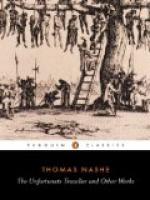|
This section contains 8,916 words (approx. 30 pages at 300 words per page) |

|
SOURCE: Mentz, Steven R. “The Heroine as Courtesan: Dishonesty, Romance, and the Sense of an Ending in The Unfortunate Traveler.” Studies in Philology 98, no. 3 (summer 2001): 339-58.
In this essay, Mentz discusses Nashe's use of generic models in The Unfortunate Traveller, particularly his adaptation of the romance. The critic suggests that Nashe pressed on the tensions within the romance genre, not so much for satirical effect but as a means of expanding the genre and exploring its potential.
Many are honest because they know not how to be dishonest.
—Thomas Nashe1
Thomas Nashe has long been considered among the least classifiable of Elizabethan writers. The most famous critical pronouncement on him emphasizes the mystery of his accomplishment: “In a certain sense of the verb ‘say,’” writes C. S. Lewis, “if asked what Nashe ‘says,’ we should have to say, ‘Nothing.’”2 This unknowable quality in his work connects Nashe to...
|
This section contains 8,916 words (approx. 30 pages at 300 words per page) |

|


